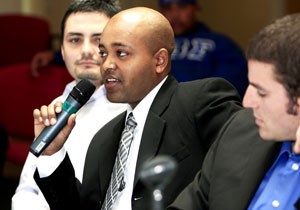Speakers at the town hall meeting held yesterday expressed concern that the vague wording and misleading scope of a potential state ballot measure could carry grave consequences for the UA and its minority students.
The meeting, held in the Kiva Room at the Student Union Memorial Center, gave information on and discussed the possible detrimental impact of the Arizona Civil Rights Initiative, an as-of-yet unapproved measure backed by Ward Connerly, founder and chairman of the American Civil Rights Institute.
Under the measure, UA programs that are thought to show preference with regard to race, gender, ethnicity and national origin could lose state funding.
The meeting began with a video interview of Connerly, a former regent of the University of California, in which he argued against affirmative action in public education.
“”It’s important to understand that our initiative is not to eliminate all forms of affirmative action,”” Connerly said. “”This initiative would prohibit only forms of affirmative action with preferential treatment, such as race and gender.””
His other arguments for the measure – to be voted on statewide in November and must be approved by June – included the growing gap between the lower- and upper-class students in college settings, and the assumptions that all minorities aren’t financially well off.
“”This initiative would not forbid anyone from helping people who are impoverished,”” he said. “”It’s when you start saying, ‘Well, how about giving minorities a break?’ Not all minorities and not all whites are impoverished or in need. That’s the problem. The presumption that you are a minority you are ‘disadvantaged’ is incorrect. I’m prepared to live by the same standards as everyone else.””
Guest speakers at the meeting, which drew more than 60 people had opposing opinions on the initiative, and the repercussions it would have.
If passed, the measure could adversely alter not only admissions and hiring processes at the UA, but also programs such as tutoring, mentoring, outreach, recruitment and counseling, said Michael Slugocki, vice chair of the Associated Students of the University of Arizona.
He was also wary of the effect on programs designed to encourage girls and minorities to pursue careers in math and science.
“”One of the most powerful rhetorical pieces of the initiative is focusing on socioeconomic status, which is kind of a red herring,”” said Kami Hoskins, a second-year law student. “”That argument is suggesting that racism and sexism no longer exist.””
The speakers – also including ASUA President Tommy Bruce and Melissa Vito, the dean of students – nearly all agreed the measure will be added to the state ballot by June.
The main goal of the panel they formed was to ensure students vote and can make an educated decision, speakers said.
A common criticism among them was that the measure, as written for vote in other states, claimed to be championing the broad category of “”civil rights”” without specifying its total influence.
“”We don’t want people to be confused,”” said David Martinez III, a secondary education senior and student regent.
Some speakers thought lessons should be learned from the measure’s passage in California, Washington and Michigan.
Following the passage of Proposition 209, the version of the initiative in California, enrollment of underrepresented students in the University of California professional schools declined drastically, said Celina Ramirez, an equal opportunity specialist and member of the panel.
“”The percentage of people of color attending universities in California dropped 56 percent between 1996 and 2006 after Proposition 209 passed,”” she said.
The UA would be affected in a very similar way if the initiative passes in Arizona, she said.
“”The university would have to look at all its programs, talk to its lawyers, look at other states, decide if they’re going to get sued over anything, and start a long, drawn-out process to see what they will keep or what will change,”” she said.
“”If we’re going to start eliminating affirmative action, we are going to need to reconceptualize the whole form of the system, because it already caters to (a.) whites, and (b.) men,”” said Derek Adams, an English graduate student in attendance.
In light of the measure’s potential impact, Bruce implored students statewide to register to vote.
“”At the three universities, there are over 100,000 students, and that could make a phenomenal impact,”” he said. “”What’s important right now is educating yourself on what the initiative is and knowing what stance you’re going to take.””
Although UA President Robert Shelton has sent out a memo stating the university’s commitment to equal opportunity, many in attendance wondered why he had not made an official statement on the initiative.
“”We can act as private citizens, but as long as we’re state employeeswe cannot act in our roles,”” Vito said.
ASUA is scheduled to take its official stance March 26, Bruce said.
The initiative may also be on the ballots for Colorado, Missouri, Nebraska and Oklahoma in November.









